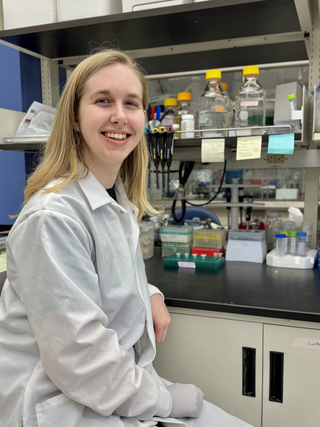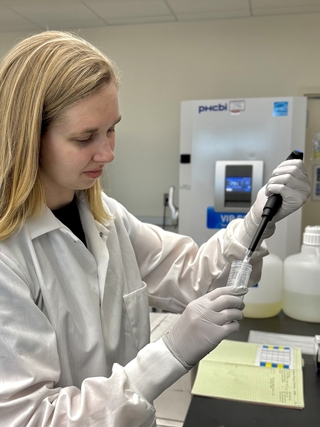Meet West Campus graduate student Rebecca Schelling

Rebecca Schelling at the lab bench at Yale’s West Campus
On route to a doctoral degree, Yale’s graduate students typically spend five to six years undertaking a rigorous program of study, completing coursework, qualifying exams, dissertation research and a dissertation defense. Often referred to as the “engines” of our research endeavor, grad students are hands on scientists: conducting experiments, analyzing data, writing up their findings, and playing a crucial role contributing to scientific advancements alongside faculty, postdocs, and other researchers.
Rebecca Schelling is in her second year as a Biological and Biomedical Sciences (BBS) student in the Pharmacology Department. She does her research at Yale’s Institute of Biomolecular Design and Discovery (IBDD), which focuses on the discovery of new biological molecules and their application to problems in biology and medicine.
What is a typical day like in the lab?
RS: Anything but typical! My experiments include living creatures and living cells that wait for nobody, so I can be on campus early or late or on the weekend. Some days I’m waiting for something to happen. In the lab you really have to be your own boss, putting in as much effort as you’re willing to each day. Working in a biological science lab is challenging because there are so many parameters to work around. I can’t just leave an experiment and move on to something else.
When did you first come to the West Campus?
RS: I visited West Campus as part of a BBS recruitment visit. In my track most of the professors are on the Med School Campus, and there’s a perception that you might be isolated at West Campus.
“I had a background in chemistry and wanted to do pharmacology, so the institute structure - the diverse community of scientists that are here – was something I was looking for.”
During my first year, I took a class in the Pharmacology Department with Professor Kathryn Ferguson [of the Yale Cancer Biology Institute] that was primarily situated on West Campus. It was a great class; we had workshops with the research cores at West Campus and talked with different expert groups about taking a basic research discovery from the bench to the clinic. I even had the opportunity to work with a scientist at Regeneron to present his recent work in biotech.
What did you consider when matching to a lab here?
The fundamental reason for being here is the professor I wanted to work with. Previously I worked at the National Institutes of Health for two years as a post bac fellow. I was lucky to work with Dr Susan Amara [Scientific Director of the Intramural Research Program at the National Institute of Mental Health] who was fiercely supportive of female scientists. It was striking to me that somebody of her stature still found time to talk to me. I remember a story that Susan stopped a post doc interview early to put candles on a cake for a lab member’s birthday. She is intensely focused, but equally passionate about the people who are doing the science.
“I wanted a mentor at Yale who would support me scientifically but also invest in me rather than what I could do for them.”
Professor Ken Loh had both attributes. My research experience is in neuropharmacology, and I had a chemistry background – and I wanted to do both. I’m invested in molecules and how you apply them to the brain. Ken’s lab uses chemical biology tools, such as proximity labeling, to study the peripheral nervous system and inter-organ communication.
It quickly became clear that Ken would be a supportive mentor, but what sealed the deal for me was that my rotation didn’t go well in terms of science. My cells ended up getting contaminated and I had to throw everything away. I was worried to tell Ken, but he just sat down, wrote out a plan, and then put on a pair of lab gloves to help with the grunt work.

Making the right mentor match guided Schelling in her choice to be at West Campus
Have you found other benefits of working at West Campus?
Putting myself here I feel like I’m known as a chemical biologist and a pharmacology student. People tend to know each other here and this makes interacting across disciplines much easier.
“Besides looking for supportive mentorship, because of my interdisciplinary background I’ve gotten comfortable living at the border of different fields.”
I like the intentional variety in the West Campus Institutes, where scientists from different fields are working together in the same space. People are trying different angles. The way our labs were designed makes it seamless to interact with everyone.
In IBDD we have a chemical biologist who has a lot of physiology expertise, an immunologist, and a microbial scientist who is by name more of a chemist. These scientists all share connected lab space, so I have access to all these slightly different facets of drug discovery.
Our faculty are completely accessible. It’s an advantage to be able to learn about and use different skill sets and apply them to novel problems. The institute model is a great preparation for [the pharmaceutical] industry. We have the option to try to find solutions to a particular disease, while also developing broad skill sets in a wide variety of topics so we can respond to specific health problems.
“West Campus is the manifestation of working at borders so we can break through boundaries. That’s what science is about today.”
What is your experience of being located just outside New Haven?
Sure, traffic can be a challenge, but I haven’t found it a big deal. Students in New Haven also have to take a shuttle or drive across town to the Med School Campus. Incoming students tend to think that the main science ecosystem is in New Haven, and most faculty are based there, but there are real advantages of being here at West Campus. Aside from the Institute model, having campus spaces and events where we can get together and connect with colleagues is so helpful.
We’re grad students so food is a motivation! Scientists in different buildings don’t always interact, so having welcoming events in the Conference Center to get together purely to talk is really valued. We’re always trying lots of different ideas to build connection. We’re scientists, so we’re used to trying things out. If they don’t work, we just try something else until we get the right formula.